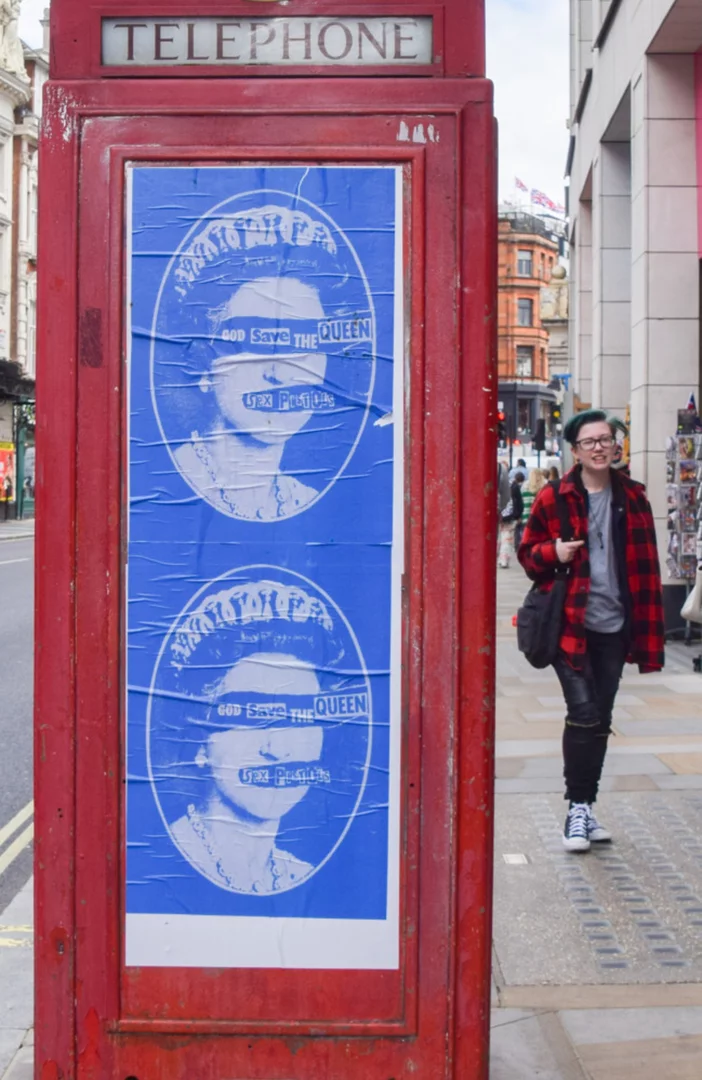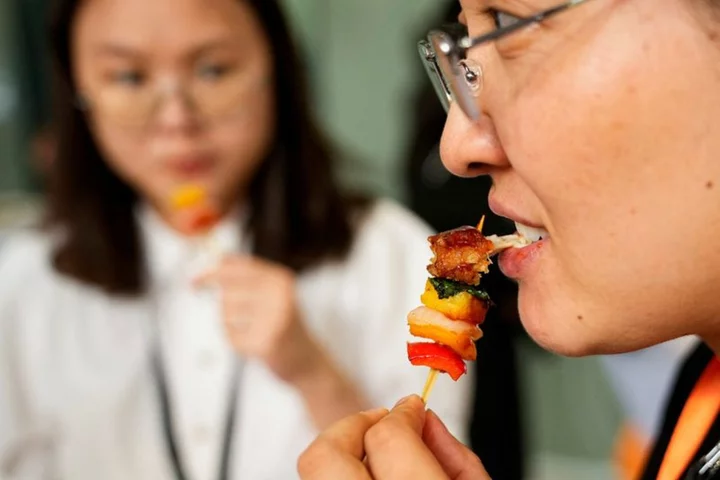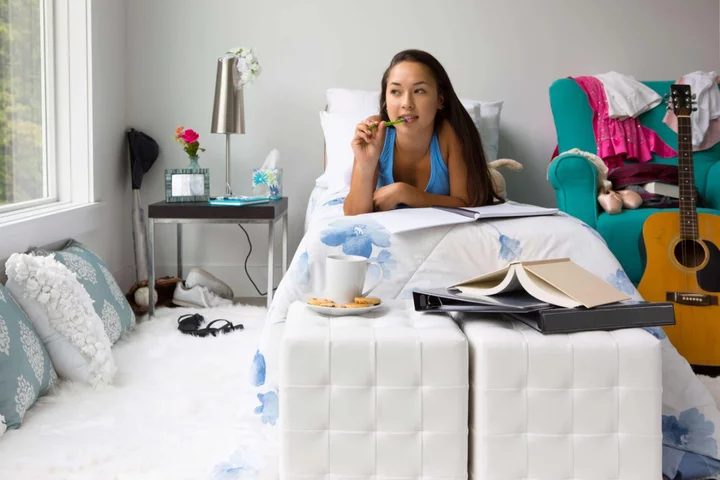
Big fashion is getting bigger. Parent of Coach will buy Versace owner Capri in $8.5 billion deal
Tapestry, parent company of luxury handbag and accessories retailer Coach, is buying the owner of fashion brands including Michael Kors, Versace and Jimmy Choo, Capri Holdings
2023-08-10 19:53

US FDA approves Johnson & Johnson's blood cancer therapy
(Reuters) -Johnson & Johnson said on Thursday the U.S. Food and Drug Administration had approved its antibody-based therapy for patients
2023-08-10 19:45

Sex Pistols artist and anarchist dies
Jamie Reid was the visual artist behind punk rock legends Sex Pistols' artwork.
2023-08-10 19:26

Mars is spinning faster and faster and scientists are baffled
It’s been revealed that Mars is spinning at a faster and faster rate, effectively shortening the length of a day on the planet’s surface. Data collected by NASA’s Interior Exploration using Seismic Investigations, Geodesy and Heat Transport (InSight) lander has left experts puzzled. The length of every day is shortening by a fraction of a millisecond each year, and experts don’t know exactly why it’s happening. The findings also showed that the planet is 'wobbling' in an unusual way due to the molten metal “sloshing” in its core. Sign up to our free Indy100 weekly newsletter The reason for the planet speeding up is unclear, but one theory states that ice building up at the poles could be behind it. Dr Bruce Banerdt of NASA’s Jet Propulsion Laboratory in Southern California and his colleagues are behind a study into the findings, which were published in the journal Nature. Dr Banerdt said: “It’s really cool to be able to get this latest measurement — and so precisely. “I’ve been involved in efforts to get a geophysical station like INSight onto Mars for a long time.” He went on to say: “Results like this make all those decades of work well worth it.” Meanwhile, another new study has found that Mars may have once had wet and dry seasons – like those on Earth – conducive to the emergence of life. Researchers have discovered fossil evidence suggesting the red planet had a cyclical climate more than three billion years ago. Nasa also recently discovered “diverse organic matter” on the surface of Mars, which could change our understanding of the planet and the search for life in the universe. Have your say in our news democracy. Click the upvote icon at the top of the page to help raise this article through the indy100 rankings.
2023-08-10 19:25

Janis Joplin and The Kinks among London's Music Walk of Fame 2023 inductees
London's Music Walk of Fame is set to honour music legends including Janis Joplin, The Kinks and Eddy Grant.
2023-08-10 19:22

Jamie Dornan 'doesn't worry' about being remembered as Christian Grey
Jamie Dornan accepts that he "can't control" the public's "pre-ordained perception" of him.
2023-08-10 19:20

‘Long Covid has taken away my ability to eat food or urinate - I don’t recognise myself anymore’
A young woman whose health “deteriorated rapidly” after being diagnosed with long Covid and suffering a liver bleed is now in a wheelchair, feeds herself through a tube in her chest and has been unable to urinate in three years. Abigail Snowball, 29, was told she suffered from a rare condition known as Fowler’s Syndrome a few months after she was diagnosed with long Covid in July 2020 and her bladder stopped working. The social worker, from Northumberland, says she was “never sick” and enjoyed long runs before testing positive for coronavirus in early 2020 and feeling a sharp pain under her ribs which scans showed was a bleed on her liver. Abigail had not fully recovered from the virus and since the diagnosis, her health has gone from bad to worse, to the point where she has not been able to urinate in three years. She now depends on her husband Mark, 34, to carry her to the bathroom so she can empty her bladder, which can take up to four hours, and has not been able to enjoy a mouthful of food for nearly a year. “I had never really been ill before,” Abigail told PA Real Life. “As a child, I was always really lucky and never poorly. I look back at pictures from before Covid and I don’t even recognise myself.” Abigail had completed a 20-mile race, the Run Northumberland BIG 20, just a week before testing positive for Covid and having to quarantine away from Mark, who works in maintenance for Nissan. “It was very much at the start of the pandemic, back at the time when there weren’t any vaccines or much testing,” she said. “It was just tiredness like I’ve never felt before in my entire life. I remember having a cup of tea and struggling to lift the mug up.” Like many other people’s experience of catching Covid, Abigail’s health improved over the next 10 days. “I did get better, but I never fully recovered,” she said. But a couple of months later, while visiting her parents, Jane and Ray Cresswell, in Cornwall on holiday, she suddenly began feeling a sharp pain under her ribs. “It was a really strange location to have pain,” she added. She visited the GP a week later and was admitted to Northumbria Specialist Emergency Care Hospital (NSECH) in July 2020, where scans revealed Abigail had suffered a bleed on her liver. “That’s when they diagnosed me with long Covid,” she said. “There was no other explanation, because they tested for blood disorders and carried out a scan. “They asked me if I had a fall or accident, but there was literally nothing.” Abigail was recovering from her liver bleed in hospital late one evening when a nurse asked when the last time she urinated was. “I actually thought, ‘god, it wasn’t since this morning’,” she said. “From that point, my bladder never regained any function. That was really the start of my health declining quickly.” Doctors hoped her bladder block was simply a result of the liver “trauma” and that she would be on the mend soon. But, sadly, this was not the case. A few months later, Abigail was diagnosed with a rare condition called Fowler’s Syndrome, which causes women to have problems passing urine. Abigail’s condition has deteriorated over the past few weeks and she is now losing weight rapidly. “I am now sleeping on the sofa downstairs and my husband Mark is having to carry me to the toilet and back again,” she said. “We can spend up to four hours at a time trying to drain my bladder, and the pain is just unbearable. “I went from running 20 miles to using a wheelchair. You don’t realise how inaccessible the world is until you are in that position.” Since the diagnosis, Abigail has spent more than 350 days in hospital and undergone 12 surgeries, including one in October 2021 to try and reconstruct her bladder. To make matters worse, she developed intestinal failure last year, which means she can no longer eat food. “I haven’t eaten anything in a year now,” she said. Instead, she is fed through TPN (total parenteral nutrition), a tube in her chest which delivers nutrients directly into the blood stream. Abigail and Mark, who married earlier this year in May, both received close to six months of training on how to perform the feeding procedure given there is a high risk of infection. “We had never even heard of that – being fed through a line into your heart,” she said. Abigail has been told by doctors that her liver bleed was “extremely likely” to have been caused by Covid. While Covid is known to harm the lungs, it has also been found to affect other organs, including the heart, liver and kidneys, but wider research is needed to better understand its long-term effects. Liver problems are common among patients with Covid-19, according to a study carried out by researchers at Oxford University and published in the peer-reviewed journal Hepatology Communications. Abigail, whose condition is considered “severe”, is hoping to receive specialist treatment in London, known as bladder Botox, which involves injecting Botox into the bladder every three to nine months, but there is no guarantee this will work. “Because of how severe and complex my case is, we’ve exhausted all our options here and the doctors are saying that I need to see the specialists in London,” she said. “Removing my bladder completely remains on the cards, but it’s incredibly high risk because of my intestinal problems. “There is no cure for Fowler’s, so it’s about managing it in the best way possible.” The combination of health conditions has left Abigail unable to perform everyday tasks. “It’s funny because the things I want to be able to do are so normal,” she said. “Just being able to wake up, take the dog for a walk and go to work. “Things that in the past, I completely took for granted.” To help cover the costs, Abigail’s friend Emma Holt has set up a GoFundMe which has received thousands of pounds in donations. “We never imagined in our wildest dreams that we would raise the amount of money that we have already,” she said. “It’s the one thing that really keeps us going, when things are really difficult. “Knowing that we have so many people behind us and supporting us is amazing.” Fowler’s Syndrome is most often caused by infection or following surgery or trauma, but a link to long Covid has yet to be established and more research is needed. Dani Coombe, CEO, Fowler’s Syndrome UK said: “It’s too early to say if long Covid is a trigger for Fowler’s syndrome; we haven’t seen an increase in Fowler’s and retention post-Covid yet, and there is no indicator that urinary retention gets worse. “Our research into what patients believe triggered their urinary retention shows that infection is the most common trigger at 57 per cent, followed by surgery in 32 per cent of patients and trauma at 19 per cent. “It would be noteworthy to see in coming years if there is an increase in women with Fowler’s because of the trauma of Covid-19.” Read More Fake meat is dying, but that shouldn’t mean the end of veganism What I gained (and lost) from walking 10,000 steps a day for five months Woman behind ‘not real’ plane tirade identified as marketing executive with $2m home Charity boss speaks out over ‘traumatic’ encounter with royal aide Ukraine war’s heaviest fight rages in east - follow live
2023-08-10 18:56

China expands the number of countries for travel by its big-spending tourists
China has increased the number of countries that its big-spending tourists can visit by more than 70 following the lifting of its last COVID-19 travel restrictions
2023-08-10 18:28

Mote Kicks Off Second Biomass to Hydrogen Project in Northern California
LOS ANGELES--(BUSINESS WIRE)--Aug 10, 2023--
2023-08-10 18:25

China's CellX pilots lab-grown meat production, eyes U.S. market
By Casey Hall SHANGHAI In an unassuming industrial park on the outskirts of Shanghai, an unusual taste test
2023-08-10 15:48

Sydney Sweeney reveals reaction to Madame Web role
She is playing Julia Carpenter in the Sony movie.
2023-08-10 15:26

6 survival tips for parents of live-at-home university students
A fifth of new students plan to live at home while studying at university, according to new research. But while living with their parents will undoubtedly be cheaper, it could create problems if teenagers try to live a typical student lifestyle in their mum and dad’s house – so experts advise ground rules. A new UCL and Sutton Trust study of more than 11,000 Year 13 students in England, who have either applied or plan to apply to university, found 20% had decided to live at home during term time if they got into university (14% had not yet decided). Nearly a fifth (18%) said the main reason was because they couldn’t afford to live away from home, while 46% said they wanted to be near their families. Gill Hines, co-author of Later! A Guide to Parenting a Young Adult (Piatkus), says living at home while doing further education is an increasing trend. “There’s many, many more kids living at home when they go to university – universities are reporting a lot more students are local people. But there can be problems, particularly with the social side of things,” she says. To help life with an adult student living at home remain as harmonious as possible, Hines says it’s vital for students and parents to discuss exactly what the house rules are well before term starts. “Sit down with them and talk about how things are going to be once they start uni,” she advises. “You need to talk to them about everything their new life may entail, including overnight guests, finances, and them behaving like adults so you can treat them like adults.” Here, Hines outlines the issues that need to be addressed in families where teenage students choose to live at home… 1. Set rules for helping in the houseParents need to talk to their teenager about how they’re going to contribute to the running of the home, stresses Hines. “They need to be doing much, much more than they probably have been doing. If they want the rights of being a young adult, they have to do the work of a young adult. Rights and privileges are great, but there are responsibilities too.” It’s important to be clear about what’s expected of them, which should include a high level of self-care (you probably don’t want your house to smell like student digs). They may be expected to buy and make their own food, and if so, clear up after themselves, do their own laundry – or take a turn in doing the household laundry – take their turn to clean the bathroom, put the bins out, etc. “You could either have set chores, or say that every fourth week or whatever they do a particular chore, whatever seems fair. It all needs to be discussed with them,” she says, although “they won’t like it”. Adding: “We want them to have a nice life at university, but they do need to knuckle down. Hopefully they’ll be moving out [in the future], and they need to be able to look after themselves.”2. Discuss overnight guests Parents may already have had ‘the talk’ about girlfriends or boyfriends staying overnight and what’s acceptable, but if not, now is the time to do it, says Hines. “They’re more likely to have a partner or be in a sexual relationship at this age, and may be playing around because they’re at that stage of life. Parents need to have a chat with their child about it, and also with each other about how comfortable they are with overnight guests, and some rules need to be outlined.” She suggests that, if possible, it may help to move their bedroom closer to an outside door, so they can come and go with more freedom. “I know it’s not possible for everybody,” she notes, “but if you can change an upstairs room to one downstairs for them, it might help them to not have to trail right through the house with their guests, and they’ll have a sense of being more independent.” 3. Don’t treat them like a child Hines says it can be tempting for parents whose young people live at home to treat them like children, but treat them as adults and they’re more likely to behave like one. “They’re that bit older, and they no longer get the right to be a child who’s looked after 24/7,” she stresses. Getting themselves up, getting themselves to uni, and getting their work done on time is not the parents’ responsibility anymore. “You need to be clear about that,” she stresses. “The whole point of university is for them to grow up. It’s all down to them now – you’re no longer responsible for their day-to-day life – they are.” 4. Explain what you’ll do if they break your rules Hines points out that although parents of adult children don’t have many sanctions if their house rules aren’t followed (they’re too old to be grounded) be aware of what you pay for. “If you pay for their phone and their travel and food or anything else, they need to accept that not every parent is doing that for their child at the age of 18,” she says. “It’s not a right, it’s a privilege, and some of it can be taken away.” 5. Encourage them to get a job Hines points out that many students living away from home while at university have to get a part-time job to make ends meet, and says: “I would encourage them to get an income – as well as needing the money, it’s good experience.” 6. Discuss finances Although once teens are earning, some parents may expect a contribution to room and board, Hines says if they’re students with a part-time job it might not be a feasible request. “I don’t think they should be contributing to the financial running of the home – at that age, I think it’s unrealistic to expect them to – but I think they should be contributing in other ways, like helping around the house.”
2023-08-10 13:59
